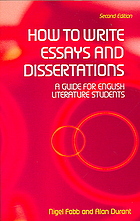

Most ebook files are in PDF format, so you can easily read them using various software such as Foxit Reader or directly on the Google Chrome browser.
Some ebook files are released by publishers in other formats such as .awz, .mobi, .epub, .fb2, etc. You may need to install specific software to read these formats on mobile/PC, such as Calibre.
Please read the tutorial at this link. https://ebooknice.com/page/post?id=faq
We offer FREE conversion to the popular formats you request; however, this may take some time. Therefore, right after payment, please email us, and we will try to provide the service as quickly as possible.
For some exceptional file formats or broken links (if any), please refrain from opening any disputes. Instead, email us first, and we will try to assist within a maximum of 6 hours.
EbookNice Team

Status:
Available0.0
0 reviews
ISBN 10: 0582784557
ISBN 13: 9780582784550
Author: Nigel Fabb and Alan Durant
The first book that literature students should read, this guide reveals the distinct set of skills, conventions and methods of essay and dissertation writing. Taking students through the various stages of writing, from planning to final submission, it offers specific guidelines and a lively, detailed commentary on actual examples of student work at each stage.
Unit 1 Introduction
The Importance of Writing in Literary Studies
Four Basic Principles
A Writing means construction
B Writing involves a constant process of re-construction
C Writing is a way of thinking
D Writing is different from talking
Practice and Experimentation
Preparing for Work
Unit 2 Writing on a Prescribed Topic
What Essay Questions Ask You to Do
Types of Prescribed Question
Debate or evaluation
Analysis, exploration and classification
Comparison
Exemplification or description
Exam Questions
In the exam room
Planning your answer to an exam question
Unit 3 Devising Your Own Topic
Some Questions to Ask Yourself
What is the question I want to answer?
What can I expect by way of an answer?
What methods will help me find an answer?
Will my chosen field expand indefinitely?
How does my topic relate to current work in the field?
Am I interested enough?
Giving Your Chosen Topic a Structure
Essay focus
Mode of argument
Combining focus and mode of argument
Giving Your Essay a Title
Unit 4 What Markers Want
Assessment Criteria
Outline of assessment criteria
Making sensible use of assessment criteria
Learning Outcomes
Example of learning outcomes
Using learning outcomes as you study
FAQs About How You are Marked
Will assessment criteria stop me being original?
Will I get blamed for expressing my opinion?
Will I be marked down for including general background material?
Imagining Your Reader as Someone Particular
Unit 5 Selecting Primary and Secondary Texts
How to Choose Your Primary Texts
Choosing an edition
Kinds of Primary Text and How to Use Them
Critical edition
Facsimile edition
Electronic edition
How to Choose Secondary Texts
Being selective
Keeping Notes on Your Reading
Unit 6 Getting Help From Reference Works, Online Resources and Your Supervisor
Using Secondary Texts
Research publications
Textbooks
Self-published work
Reference Books
The Oxford English Dictionary
Concordances
Biographies and handbooks
Historical information
Tracking down allusions
Other useful sources
Keeping References
Reading What You Found
Learning by Being Supervised
Unit 7 The First Draft
Starting to Write
Keeping to a Given Format
Length and proportion
Writing to an Outline
Things to avoid in writing your outline
Using ‘outline view'
Unit 8 Developing Your Argument
Causation, Correlation and Coincidence
Assembling a Description or Commentary
Classification
Presenting Alternative Arguments
Experimenting
Providing Contexts for Texts
Comparing Texts
Building an Argument Around a Word
Unit 9 Weighting Different Elements in Your Argument
Asserting, Justifying and Presupposing
Assertion
Justification and evidence
Presupposition
Given and new information
Generalising
Giving Examples
Signalling Attitude to your Own Argument
Epistemic modality
Hedges
Unit 10 The Voice to Write In
Your Register and Your Voice
Academic register is not your spoken voice
Standardisation
Sentence length and sentence complexity
Agency and passives
Parentheticals
Rhetorical questions
Mode of Address
Referring to yourself
Addressing the reader
Referring to the reader in the third person
Reacting to Voices Outside Your Adopted Register
Stylistic imitation
Stylistic infection
Incorporating Expressions from Outside Your Adopted Register
Technical terms
Other people's terms
Expressing Taste and Value
Unit 11 Revising an Essay Draft
Showing Your Essay's Structure
Sections
Paragraphs
Sign-Posting and Connectives
Disjuncts
Mediating Essay Material for the Reader
Making Local Edits
Cut, copy and paste
Use colour
Track changes
Keep Earlier Drafts or Discard Them?
Unit 12 Editing the Beginning and Ending
Particular Prominence: The First Paragraph
Stating the main point
Explaining the essay's structure or organisation
Linking themes together
Introduction as a menu
Particular Prominence: The Last Paragraph
The ‘farewell speech'
Indecisiveness disguised as fairness
Higher authority
Disconnected personal opinion
Beginnings, Endings and Essay Structure
Unit 13 Incorporating Other People's Words into What You Write
Quotation and Paraphrase
Formatting quotations
Indicating Where Someone Else's Words Come From
‘Notes' or ‘notes and bibliography' system
Author-date system
Principles underlying reference systems
Plagiarism
How can plagiarism happen by accident?
Unit 14 Mistakes in Spelling, Grammar and Punctuation
What Makes Something a Mistake and Why Does it Matter?
Why are English words difficult to spell?
Some ways to monitor your spelling
Related words have related spellings (sometimes)
Double or single letter?
American vs British spelling variations
Problems with Grammar
The subject of a sentence and its relation with the verb
Punctuation and the Boundaries of the Sentence: Full Stop, Comma and Semi-Colon
Full stop and semi-colon
Comma
Apostrophe and s
Unit 15 Handing In
Meeting Your Deadline
Judging When Your Essay is Finished
Bibliography
Bibliographic software
Footnotes and Endnotes
Abstract or Summary
Table of Contents
Acknowledgements
Final Stage Before Submitting
Preparing for a Viva
Functions of a viva
How to prepare for a viva
Publishing Your Work
Bibliography
Index
how to write a thesis book
how to write essays and dissertations pdf
dissertation workbook
dissertation writing book
from thesis to essay writing dbq
ebook writing tutorial
Tags: Nigel Fabb and Alan Durant, write, essays